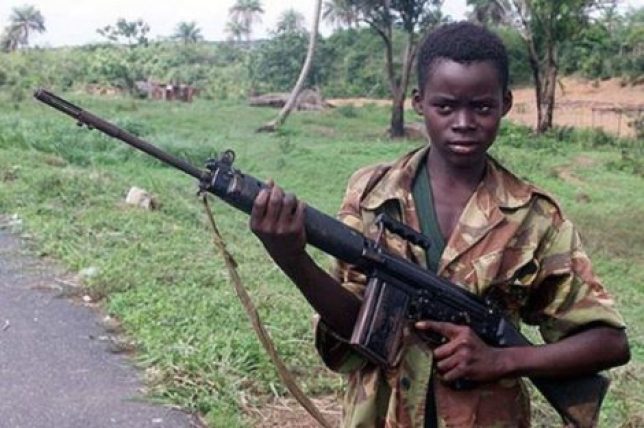Focus on Child Soldiers: Sierra Leone
By Abigail Cordaro
Staff Writer
The eleven-year-long civil war in Sierra Leone was infamously marked by its brutality, flagrant human rights abuses, and its widespread use of child soldiers. The civil war, which spanned from 1991 to 2002, irreparably damaged the lives of a generation of civilian children who were forced to become soldiers.
The majority of war crimes were committed by rebel groups such as the Armed Forces Revolutionary Council (AFRC), and the Revolutionary United Front (RUF). According to Human Rights Watch, the war resulted in tens of thousands of civilian deaths and the displacement of almost a quarter of the nation’s population.
According to CNN, rebel groups were funded in large part by former Liberian president Charles Taylor, who conducted the illegal trade of conflict, or “blood,” diamonds to finance the rebel groups in domestic conflict areas.
Peter Takirambudde, the executive director of the Africa Division of Human Rights Watch remarked that “The RUF has forced many children to join its ranks… placing them on the front lines of combat”. Not only were child soldiers forced to the front lines, but they were also forced to loot, kill, carry military equipment for the rebel forces, and were used as bait for ambushes.
The gruesome violence during the conflict was characterized by the common amputation of limbs, hands, and feet as punishment. According to Reuters, Child soldiers were often given drugs to overcome their fear and to desensitize their sense of morality to facilitate murder.
Female abductees were regularly raped and kept as sex slaves for rebel soldiers. David M. Crane, chief prosecutor for the Special Court for Sierra Leone told the Diplomatic Envoy that “They (children) were not only used as combatants, but the girls were used as bush wives to help support the fighters. The rebels could have used males over the age of 17 in compliance with international law. Their use of children was deliberate.”
In the years since the conflict ended, victims have made their best efforts to return to civilian life and share their story. In an interview with Human Rights Watch in 2012, a then-seventeen-year-old going by the name of “Abubakar” recounted his experience with the RUF.
During the war, after fighting for the RUF for four years, he sought refuge at a camp for demobilized RUF child soldiers in Makeni in March of 2000. He explained how rebel forces came to the camp frequently to try and force children to return to the RUF. The RUF often threatened the demobilized children by telling them that they would be sold into slavery when they left the camp, or that the RUF would help them find their families if they returned to fight.
Abubakar told Human Rights Watch that there was an instance in which the RUF soldiers came to the camp and threatened to kill all the children in the camp if they did not rejoin the army. When fighting broke out in May of 2000, Abubakar was abducted again by the RUF while walking near the demobilization camp, and was forced to rejoin the army. Situation similar to Abubakar’s created a cyclical rut for former RUF child soldiers that made it difficult to leave or stay out of the fighting during the war.
A twenty-year-old survivor going by the name of “Miriam” told Human Rights Watch that she was repeatedly gang raped by seven RUF fighters over the course of three days. At the time, Miriam was only ten years old, and the RUF soldiers who raped her were as young as fourteen. The repeated sexual exploitation of girls became known as taking on a “bush wife,” says Human Rights Watch.
In the aftermath of the conflict, Liberian warlord and former President Charles Taylor was indicted and tried by the Special Court for Sierra Leone: an ad-hoc tribunal established to hold perpetrators accountable for the war crimes and crimes against humanity carried out during the civil war.
Taylor was arrested in March of 2006 on an eleven count indictment, and then transferred to the Special Court in Freetown. Taylor’s trial opened before The Hague in June of 2007, but took recess and did not resume until January of 2008. The New York Times reports that on April 26, 2012, Charles Taylor was found guilty on all eleven counts of aiding and abetting war crimes and crimes against humanity committed by rebel forces in Sierra Leone. Taylor was sentenced to 50 years in prison.
In The Diplomatic Envoy’s interview with David M. Crane, chief prosecutor of the Special Court for Sierra Leone, Mr. Crane noted that “The Special Court for Sierra Leone which I founded is now considered the model for future international prosecutions. Historians and academics now consider it the most successful of the modern era tribunals”.
When asked about the most difficult and profound parts of working with former child soldiers and victims of assault during his time as chief prosecutor, Crane remarked “(It was) How young they truly were and how ruthless they became. I felt they were victims as well and chose not to investigate or indict any of them.”

